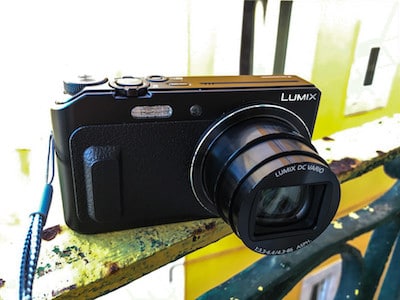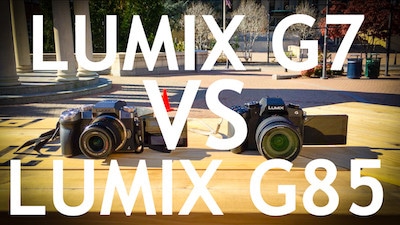
With mobile phones creeping up in quality and DSLRs coming down in price, it can seem as if the point and shoot niche is being squeezed out of relevancy. While you can turn your mobile phone into a better digital camera, in low light situations it can be hard to tell Shanghai’s city lights from illuminated dust specs on a pinhole lens. A good point and shoot camera saves money and conspicuousness, something all these cameras below can do for you, without sacrificing quality.
Panasonic Lumix ZS30 (TZ40 Outside Of United States)
One of the gadgets and tech gear I travel with, the Panasonic Lumix ZS Series cameras are a sexy blend of durability, lens quality, and long battery life. Personally, I use many of the Lumix’s manual features (it has over 40), but know a number of people who never use anything but Auto mode – which produces stunning pictures for a point and shoot. The Lumix boasts a 20 times optical zoom on its front cover, but you’ll find the 24 millimeter wide angle useful as well, especially if you don’t like falling over the back of balconies and rooftops when snapping pictures of your travel buddies.

When I asked what point and shoot do you use when traveling, many of you responded with a model of Lumix.
 Canon Powershot G16 (October 2013)
Canon Powershot G16 (October 2013)
Before I went with the Lumix, I strongly considered Canon’s G Series, mostly for its manual features and quality of lens. What held me back, and is an issue in the upcoming Powershot G16, is weak video and sensor quality that seems a camera-generation behind. The (current) Powershot G15 is still a solid camera and although Canon is releasing it’s replacement G16 next month, the changes are subtle enough to keep the G15 on this list through October.
Drop up to 2 meters and drown down to 15, what you give up in image quality and zoom, the Olympus Tough TG-2 iHS makes up in physical strength. There are obvious advantages for us travelers and you can add one more – the Tough TG-2 iHS boots extremely fast – ready to take a picture within .9 seconds from off to on. For the millions of times you’ve fumbled to take a picture, only to get snap of elephant dust to post on Facebook, you can take the Tough and literally throw it at the problem.
 The S9500, Nikon’s high-zoom camera, is a grower, not a show-er. The Coolpix S9500 has a wide focal range of 25-550mm, but keeps that massive zoom in a slender 3 centimeter frame. In ample-light situations the S9500 knows how to use that lens as well, taking fairly crisp photos at safe distances from wildlife that may want to eat you. Especially if some idiot you’re traveling with threw their Olympus Tough TG-2 at a pack of elephants.
The S9500, Nikon’s high-zoom camera, is a grower, not a show-er. The Coolpix S9500 has a wide focal range of 25-550mm, but keeps that massive zoom in a slender 3 centimeter frame. In ample-light situations the S9500 knows how to use that lens as well, taking fairly crisp photos at safe distances from wildlife that may want to eat you. Especially if some idiot you’re traveling with threw their Olympus Tough TG-2 at a pack of elephants.
This is not a cheap point and shoot camera, with a price around $750. At first look, it doesn’t seem to have the impressive specs some of the other cameras on this list do – a relatively mundane 28-100mm zoom lens – but it has a large sensor for a machine its size. Sensors are a highly overlooked component for most amateur point and shooters; they how much light incoming from the lens can be recorded. The Sony DSC-RX100 II has a square 2.54 cm (1 inch) sensor, roughly 55% larger than the Lumix above.
- An Analogy For Understanding Sensor Importance– Imagine photons as drops of beer raining from the sky, the sensor as a bucket: bigger bucket=more beer saved (yay!). In other words, more photons generally results in better image quality.
Within Shot
There are a few other cameras worth mentioning if you’re still not convinced or need to feel better about a recent purchase. The Canon Powershot SX280, Panasonic Lumix DMC-LX5, and Nikon Coolpix P330 have their drawbacks but should hardly be dismissed outright. Remember, good cameras don’t necessarily give you good photos and you can learn to take better pictures without getting a better camera, change your focus for memorable shots, and spice up images without professional software after your next trip.












The Nikon Coolpix 330 is an awesome camera. Especially if you wanna do videoblogs or similar. It has the capability to film in 120fps which gives you a nice slowmotion effect when played back.
Video is one aspect on point and shoots that varies widely, good to point out the ones that do it well.
Definitely give my vote for the Lumix. I bought one years ago on sale in Spain, and when it broke two years later from a drop, I was devastated. I upgraded to a Rebel, but miss the ease of using its settings and its light frame!
I can imagine, it’s a big jump in weight/size realtively, but hopefully the Rebel is serving you well!
Still loving my Lumix ZS30! For a traveler who likes to take photos but doesn’t take it super seriously, it’s been a perfect camera.
And they keep getting better with every new model, something many lines of gadgets have a hard time maintaining over time.
Thanks for the reviews. My problem with the point-and-shoot cameras is that when the lense retracts it brings dust into the camera, which clogs up photos. I went through 4 cameras on my RTW. Is there a point-and-shoot that avoids this problem?
I would recommend looking at the Olympus Tough series, the zoom lens is enclosed in the case, keeping it water and dust proof.
Timely posting, Anil. I damaged the lens of my beloved G11 on my last trip and am now looking for a replacement. This posting has made my research easier. Thanks.
Hopefully it was toward the end of the trip so you didn’t miss out on too many photos!
Hey Anil! Thanks for all the info and updates. Im looking into buying the Lumix ZS30, but saw that they have released a ZS40 recently…just curious if you have any thoughts on which of the 2 versions is better for travel? Is it worth spending the extra money on the ZS40…in your opinion?
Hi Anil 🙂 Will you be shooting pictures in RAW format or is this something important for you?